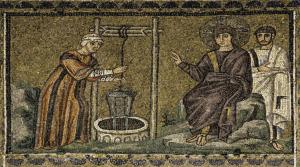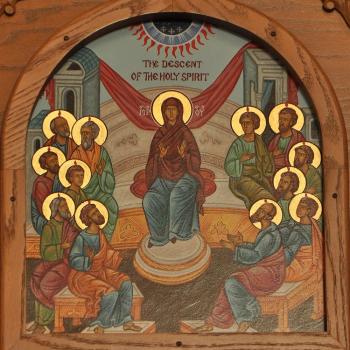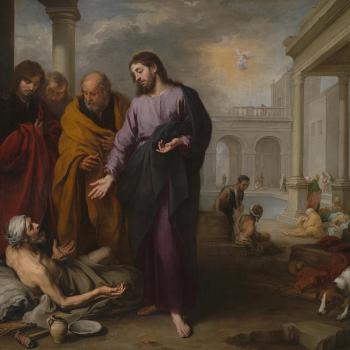As Christians, we proclaim that Jesus is the Messiah. That is, he is the Christ, the Anointed One. What does this mean? He is anointed of the Spirit. It rests upon him. It is the Spirit of Christ, the Spirit of the Son. But as the Spirit of the Son, it does more than rest upon him. Christ shares the Spirit with others, allowing them to partake of his anointing.

Those who are united with Christ find themselves anointed, like he was anointed, making them christs in Christ. As he is the Spirit-bearer, so they become Spirit-bearers. The anointing which is in Christ makes others christs when it is shared with them. They are then meant to go out in the world and share the Spirit and all its graces with those around them. And as Christ, as the anointed one, was guided by the Spirit, so they find, in their own share of the anointing, that the Spirit guides and directs them. Through it, through the Spirit of Love, they love the world and each other; it is for this reason that the world should know Christians by their love, for it is through such love the Spirit will be revealed.
Jesus made this clear with his encounter with the Samaritan woman, St. Photina. Talking with her, Christ indicated that he is willing to share his anointing with everyone. He calls it the living water, and he told Photina that he will give it to anyone who should properly ask for it. It will sanctify them, making them partakers of the kingdom of God:
There came a woman of Samaria to draw water. Jesus said to her, “Give me a drink.” For his disciples had gone away into the city to buy food. The Samaritan woman said to him, “How is it that you, a Jew, ask a drink of me, a woman of Samaria?” For Jews have no dealings with Samaritans. Jesus answered her, “If you knew the gift of God, and who it is that is saying to you, `Give me a drink,’ you would have asked him, and he would have given you living water.” The woman said to him, “Sir, you have nothing to draw with, and the well is deep; where do you get that living water? Are you greater than our father Jacob, who gave us the well, and drank from it himself, and his sons, and his cattle?” Jesus said to her, “Every one who drinks of this water will thirst again, but whoever drinks of the water that I shall give him will never thirst; the water that I shall give him will become in him a spring of water welling up to eternal life” (Jn. 4:7-14 RSV).
The Holy Spirit is available to all. Jesus’s disciples were surprised when they saw him talking to the Samaritan woman, treating her as he treated them, offering her his anointing so that she could partake of the blessings of the kingdom of God. They marveled, seeing that he had breached the social conventions of his time. Although they had once, a long time ago, held a common heritage with Moses, Jews and Samaritans were divided and fought against each other, holding rival understandings of the Mosaic tradition. Jesus, a Jew, affirmed the Jewish tradition, but he did so in a way which transcended the boundaries established in his time, and so he went to the Samaritans and offered his holy gifts to them. He affirmed that they, too, could and would receive a share of the kingdom of God, that they too could be anointed by the Spirit. He made it clear that he would not deny them, as he would not deny anyone who came to him seeking his grace.
It was Christ, and the anointing which he was to give, which would bring people together. Through that anointing, he would establish a new people with a new name, not in denial of their past and their past heritage, but in and through it. The Spirit was not just for the Jews, nor just for those who held some connection to Moses, but for all. The anointing is for all. The spiritual well is for everyone. It was only when this truth was recognized by Jesus’ disciples that they could and would receive their new name, that is, it was only after they recognized the universal nature of Christ’s grace that they were given the name of Christian.
Peter, the one who had identified Jesus as the Christ in the Spirit, the one who had been chosen to lead and guide the church as the chief of the apostles, was the one who was shown in and through the Spirit that Christ truly was willing to share the Spirit with all:
As I began to speak, the Holy Spirit fell on them just as on us at the beginning. And I remembered the word of the Lord, how he said, `John baptized with water, but you shall be baptized with the Holy Spirit.’ If then God gave the same gift to them as he gave to us when we believed in the Lord Jesus Christ, who was I that I could withstand God?” When they heard this they were silenced. And they glorified God, saying, “Then to the Gentiles also God has granted repentance unto life” (Acts 11:15-18 RSV).
Not everyone heard Peter’s pronouncement. Many of the faithful had gone abroad after the death of Stephen. They went to others like them, other Jews, trying to evangelize them, and them alone. They were not too successful in their endeavors. It was only after they were joined with those who knew and understood the universal work of Christ, those who had come after Peter’s revelation, that things changed; when Gentiles were evangelized, there was a large number of new believers, and the group together, no longer Jews or Gentiles were able to receive a name proper to them, that of Christian:
Now those who were scattered because of the persecution that arose over Stephen traveled as far as Phoenicia and Cyprus and Antioch, speaking the word to none except Jews. But there were some of them, men of Cyprus and Cyrene, who on coming to Antioch spoke to the Greeks also, preaching the Lord Jesus. And the hand of the Lord was with them, and a great number that believed turned to the Lord. News of this came to the ears of the church in Jerusalem, and they sent Barnabas to Antioch. When he came and saw the grace of God, he was glad; and he exhorted them all to remain faithful to the Lord with steadfast purpose; for he was a good man, full of the Holy Spirit and of faith. And a large company was added to the Lord. So Barnabas went to Tarsus to look for Saul; and when he had found him, he brought him to Antioch. For a whole year they met with the church, and taught a large company of people; and in Antioch the disciples were for the first time called Christians (Acts 11:19-26 RSV).
While the name Christian might have first been used in derision against the Christians, the name stuck, in part, because it was a good name which hinted at and explained who and what Christians were. They were anointed in the Spirit. They had received the water of life, the Holy Spirit, in themselves. Christ’s anointing was theirs, and so they were christs in Christ, that is, Christians.
The Spirit is sent forth into the world to draw people together. It is when Jesus’ disciples truly realized this that they could be Christians. They were no longer bound to one particular historical people with one particular heritage; they saw they were to unite all humanity through Christ’s anointing. They had become people of the Spirit, the Spirit of Love, and so long as they live out the love which the Spirit gives to them, the name Christian truly was theirs.
Christ revealed the glory of the kingdom of God to the Samaritans. He reached out beyond the confines of the social conventions of his day. He offered the gift of the Spirit to the woman at the well, and she accepted it. She became one of his disciples. Salvation might be from the Jews, but it comes from the Jews to the whole world. All are called to share in the Spirit. All are called to the anointing of God.
Stay in touch! Like A Little Bit of Nothing on Facebook.
If you liked what you read, please consider sharing it with your friends and family!












